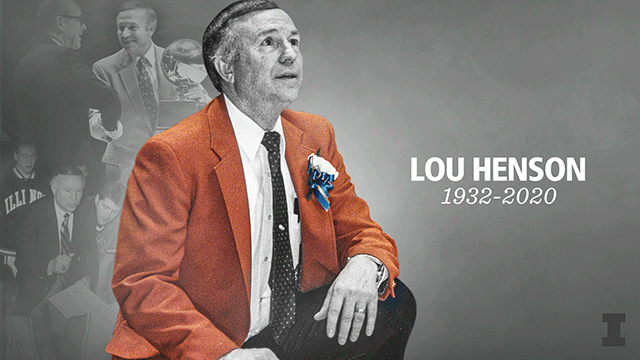
Sapora Symposium Addresses Social Justice
AHS E-News Winter 2020

For the 18th year in a row, the Department of Recreation, Sport and Tourism connected its students to leaders in the leisure industry through the 2020 Sapora Symposium. Held in a virtual landscape this year because of the ongoing coronavirus pandemic, this year’s event focused on social justice and included panels on disability, race, gender, and religion, as well as LGBTQ rights, designing inclusive facilities, and youth sports.
The symposium got underway on October 28, with a tribute to former Fighting Illini basketball coach Lou Henson, to whom the entire symposium was dedicated. His college coaching career began began when Hardin Simmons University in Abilene, Texas, offered him the head coaching position in 1962. As a condition of accepting the position, he demanded that he be able to recruit African American athletes, thereby integrating not only the basketball team but also the campus. Later, as the athletic director, he added women’s basketball and women’s volleyball to the college’s sports program, well before Title IX mandated gender equality.
As the head coach at Illinois for 21 years, Lou Henson won 423 games. He presided over a memorable 1989 season, when the team compiled a 31-5 record and went to the NCAA Final Four. Panelist Ed Hightower, longtime NCAA referee and National Association of Sports Officials’ Gold Whistle Award recipient, said most people know what a great coach Henson was, but are less familiar with his achievements as a compassionate humanitarian.
“He was ahead of his time,” he said. “There’s so much time being spent in our country today trying to define social justice. If you just go back to the simple philosophy that Coach Henson had, it was all about opening doors of access and opportunity for others.”
Joining him for the panel discussion was Mark Coomes, whose own coaching career spanned 33 years, including nine as an assistant coach to Lou Henson at Illinois; Rob Evans, former head coach at the University of Mississippi and Arizona State University, who played for Henson; Jim Phillips, Combe Family Vice President for Athletics and Recreation at Northwestern University; and Mary Henson, who was married to Lou for more than 65 years and who said of the tribute panel, “My hope is that the takeaway will be that just one person doing the right thing can make many positive changes in people’s lives.”
Watch the full tribute to Coach Lou Henson here.
The symposium continued with a discussion of disability with decorated Paralympic track athlete Tatyana McFadden and Paralympic and University of Illinois wheelchair track coach Adam Bleakney. Tatyana has won 17 Paralympic medals and was the first woman to win four major marathons in the same year.
Although she competed as a high school student in her first Paralympics in Athens, bringing home two medals, she and her parents had to sue the school district for her right to compete. “People didn't understand,” she said. “They didn't understand disability. They didn't understand what wheelchair racing was. And I think that sports just does such an amazing job of normalizing disability, and normalizing acceptance, and building understanding.”
Watch Tatyana and Adam talk about disability and sports here.
After Jacob Blake, an African American man, was shot and paralyzed by a white police officer in Kenosha, Wisconsin, the Milwaukee Bucks famously chose not to take the court for a scheduled playoff game in protest. On November 11, Arvind Gopalratnam, vice president of corporate social responsibility for the Bucks, joined representatives of the St. Louis Cardinals to talk about professional sports’ role in promoting social justice. He explained that the Bucks have long been committed to a variety of social responsibility efforts focused on health and wellness, education, civic engagement, community betterment, and mentoring. “But we were asking ourselves, how do we use our microphone to be leaders, to speak out on issues facing our community?” he said. As a minority community member, Gopalratnam said social justice is a personal issue, but it’s also an issue for the organization. And it’s led them to participating in conversations that are not traditional conversations in professional sports community relations programs and to going to parts of the community that are often overlooked and underappreciated.
Watch the discussion of social justice and race here.
Another session of the Sapora Symposium featured Theresa Grentz, who coached the Illini women’s basketball team from 1995 to 2007. As a player for Immaculata College’s Mighty Macs, she led the team to three consecutive AIAW national championships. She told the audience, if there’s one thing you take away from my presentation tonight, it’s “dare to dream.”
“Don't put fences around what you think,” she said. “Don't be afraid to step out and to try it. The worst you can do is fail, and you get another chance to start again. You're young, you have everything in front of you, go for it, and dare to dream big.”
See Theresa Grentz’s presentation here.
Schuyler Bailar was the first openly transgender swimmer to compete for an NCAA Division 1 team, competing for Harvard University. An advocate for LGBTQ+ rights, he shared the story of his emotional journey with the Sapora audience, including both the relief and the fear he experienced when he knew he was a transgender man.
“Gender is really important in sports, especially in swimming where there’s no gender-neutral uniform, no t-shirt and shorts in which I could hide,” he said. “When I figured out I was transgender, I was terrified that I was going to lose my sport.”
You can hear Schuyler’s compelling story here.
The Sapora Symposium wrapped up with a presentation by Tal Brody, former Illini basketball star who was drafted 12th in the NBA draft but chose to play for Israel. Known there as Mr. Basketball, he is a member of the International Jewish Sports Hall of Fame, the U.S. National Jewish Sports Hall of Fame, and serves as Israel’s Goodwill Ambassador.
Watch Tal Brody’s presentation here.
